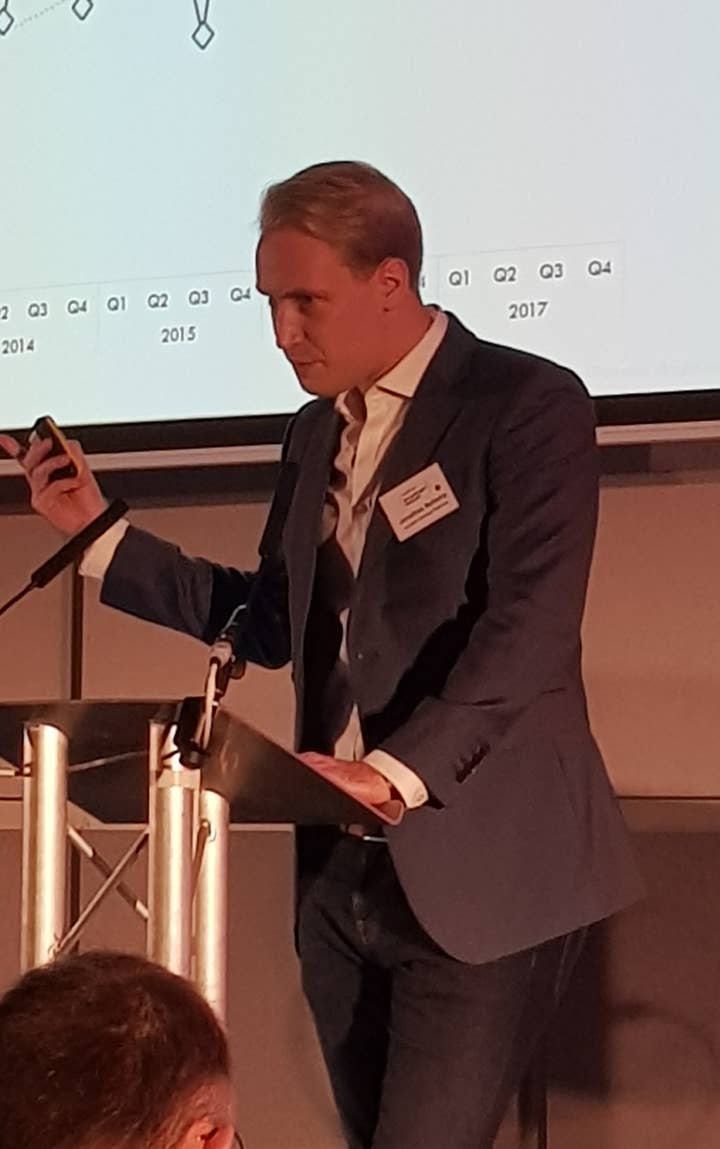The importance of honesty and learning difficult lessons when seeking VC funding
London Venture Partners' Jon Bellamy: "If we start from a dishonest note, no matter how small, that can be damaging"
Developers often lack experience when it comes to the "unglamourous stuff" of releasing a game; from hiring and firing through to marketing and fundraising, this side of the business is rarely what the founders had in mind when setting up their studio.
But as London Venture Partners (LVP) associate Jon Bellamy notes, it's the "bread and butter" for venture capital (VC) funds.
Speaking at the GamesIndustry.biz Investment Summit during EGX last week, Bellamy considered the reasons why developers get scared away from VC funding, what LVP look for in a potential investment, and what they unquestionably avoid.
It's not uncommon for developers to view VC funding as opaque and inaccessible. This perception is rarely helped by a reluctance to give up shares in the company as part of an equity investment. While VC investment results in a very close partnership that's not suitable for everyone, it's worth considering the whole picture, including the focus on long-term company growth, business development support, recruitment, and networking.
"Project financiers, if they are good, should be able to help you go to market and that is absolutely key," says Bellamy. "That's not to be underestimated.

"This isn't us-versus-them... for us it's company growth, beyond a single product even, to something that is maybe a billion dollars in the future, that's kind of what we aim for... The ultimate priority for project financiers is project success. Of course, it sounds obvious, but it's a relatively shallow horizon... For us, again, it's company success."
As Bellamy notes, early stage venture capital funding in games is "up and to the right, and has been for a really long time". So with money flowing more freely than ever before in the VC space, what are the red and green flags for a firm like LVP?
Perhaps the biggest alarm bell for a VC is dishonestly; trust sits at the very core of the relationship between a VC and a developer, and that can include over-promising.
"We're in this for the long haul," says Bellamy. "These are going to be ten-year marriages... You're going to be spending time with your VC, talking with them frequently. It's going to be two-way, and it has to be an honest conversation. If we start from a dishonest note, no matter how small, that can be damaging."
Although a difficult one for many companies, especially those starting out, having no track record is also a potential problem.
"The more positive spin on this is really be almost vulgar about what you've done before," says Bellamy. "Boast a bit. We need to feel like you guys really know what you're talking about."
Additionally, in the same way good market knowledge can take you a long way without funding, demonstrating poor knowledge can leave your pitch dead in the water.
"We expect you to understand the market you're working in if you're going to lead it," says Bellamy.
"If you have the best technical minds in the room, but nobody can make eye contact, that's really a hard sell"
This ties in with clarity of vision, or lackthereof; when pitching, verbosity won't serve you, but being clear and concise will.
"You're only selling your company to everybody; to people you're trying to hire, to customers, to investors, to everybody," he says. "You need to be good at that."
However, it's worth noting that doesn't necessarily mean you need to have all the bells and whistles of a fully-fledged company; being raw is okay as long as your pitch compelling and well put together.
"Quite often when we're speaking with companies... we come in really early," says Bellamy. "We don't expect you to have professional videographers making incredible materials for you guys, but something like a pitch deck that is compelling and clear is fine. If it's raw, white and black text, that's okay. But if you come in with your own name misspelled, that's not a great impression."
Finally, it's important to understand the difference between a product pitch, and a VC pitch.
"Absolutely your product is important and we need to hear about it, but what you're really selling us on is your team," says Bellamy. "Why you guys are uniquely qualified to solve the problem that you're solving, or create the next big thing that you're trying to create."

Further to this point, an "exceptional team" is top of the list for a VC when deciding which projects to fund; Bellamy reiterates that it's more than just a product, it's a long-term investment with hopefully a very substantial payout somewhere along the line.
"This is always going to be the biggest thing," says Bellamy. "Whenever you hear these bland talks by VCs, they're always talking about the cliché thing that is team, but it's key, it's everything.
"It has to be balanced. If you have the best technical minds in the room, but nobody can make eye contact, that's really a hard sell. You need... a commercial mind, you need to understand exactly what your team is missing... so that we can help you plug those gaps."
Bellamy also notes that its frequently teacher pension funds and other similar institutions which front their money to LVP, and so the firm has a responsibility to "do right by them".
"So by extension, we need you guys to be incentivised in the same way," he says. "You need to grow something, or be keen to grow something that has real financial value as well as any other kind of value that might be important."
Although admittedly not something every potential funding opportunity will have, a warm introduction from a mutually respected third-party will take you miles when dealing with VCs, no matter how tenuous, Bellamy stresses.
"We want to see that you've learned painful lessons"
"If you can be referred to us by somebody that we know and respect, and somebody that obviously has a good impression of you, that goes a really long way," he says, adding that such an endorsement means "that's 90 per cent of the work done [for us]".
For Bellamy and LVP, another sound judge of character and capability are your battle scars and failures.
"We want to see that you've learned painful lessons, because ultimately when we invest in a company, we recognise that some of that investment goes towards learning those lessons," he says. "We'll be paying for those learnings and that's completely fine by us. That's what we should be doing. But if you have more scars that means there are a fewer less lessons to learn and that's good for us."
Tied to this is a desire to work with seasoned founders, even if their previous projects may have gone slightly awry.
"Even if you've started a business and it might be a little bit embarrassing because things didn't go the way you hoped they would and [the exit] was kind of unceremonious, we know that they are," says Bellamy.
"These are not glamorous things and people don't start building businesses and suddenly become Apple. Usually they don't work like that, so if you've started companies and maybe the tail's not so strong but you've learned a lot, great, that's encouraging for us."
Finally, the "vulgar matter" says Bellamy, is that LVP needs to buy shares and eventually sell them at an increased price later on.
"So if we can imagine you being a billion dollar company in some shape or form similar to what you already are right now, that's usually the last green flag for us."
For more information and insights on VC funding, read our recent interview with LVP vice president of product, Are Mack Growen.
